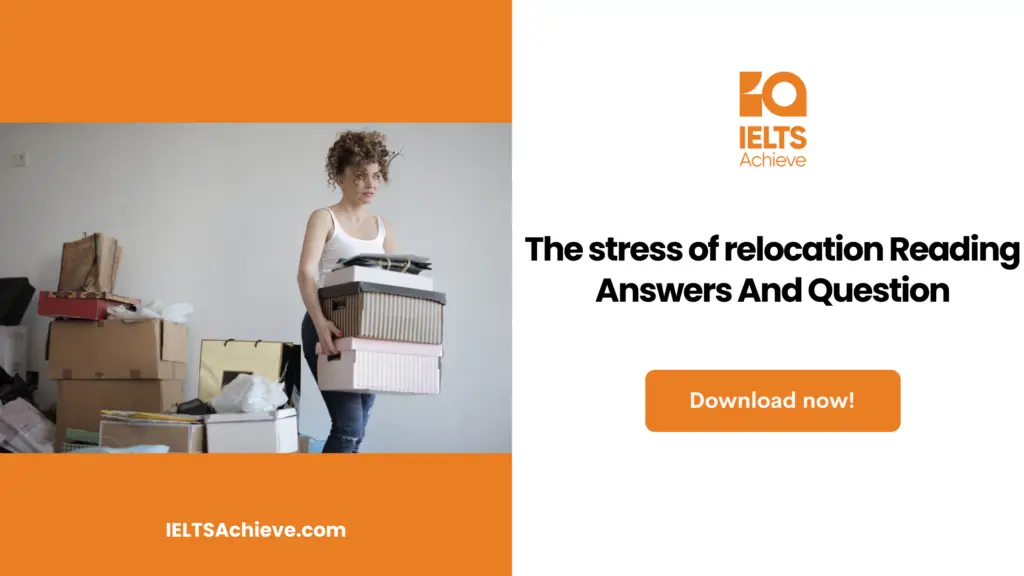The Blog post contains the following IELTS Reading Questions:
- IELTS reading matching features
- IELTS reading multiple choice questions
- IELTS reading summary completion
Stay informed and prepared for success – Explore our comprehensive Reading Test Info page to get valuable insights, exam format details, and expert tips for mastering the IELTS Reading section.
IELTS Reading Passage: The stress of relocation

The stress of relocation
How crowded is too crowded? For some, this means missing the odd long lunch; for others, it means missing lunch entirely. For some, it is the inability to take a “sickie” once a month. Then there are those for whom working every evening and weekend is routine, and their lives are chaotic. Workloads for most senior executives range from extremely busy to frantic. The head of telecommunications for the Asia-Pacific region and vice president of the management consulting firm AT Kearney, Neil Plumridge, claims that his work weeks typically last 60 hours but can range from a “manageable” 45 to 80 hours.
Plumridge is aware of his workload due to three indicators: sleep, scheduling, and family. When he gets less than six hours of sleep for three nights in a row; when he continuously needs to postpone appointments; “. According to Plumridge, the father of a three-year-old girl who is having a second child in October, “the third one is on the family side. “When I forget a birthday or an anniversary, I know things have gotten out of hand.” Being “too busy” is a highly individualized experience. However, for any individual, the sense of being overly busy over time can lead to stress, disrupted sleep, and decreased mental and physical health. According to national workers’ compensation statistics, stress is the leading cause of lost time on the job. Employees that are stressed out miss work for an average of 16.6 weeks. The costs of stress are likewise high. Comcare reports that in 2003–2004, claims for psychological injury accounted for 7% of total claims, but over 27% of claim expenditures. According to experts, the key to dealing with stress is not to focus on relaxation – such as a round of golf or a massage – but to reassess workloads. According to Neil Plumridge, he places an emphasis on figuring out what needs to change, which could entail giving a task more resources, giving more leeway, or lowering expectations. It is possible that the decision will take many days. He also seeks guidance from colleagues, claiming that his peers help each other with business challenges. “Just having a fresh set of eyes on an issue can help,” he says.
Executive stress is not limited to large corporations. For seven years, Vanessa Stoykov has operated her own advertising and public relations business, specializing in businesses providing financial and professional services. Just a few months after Stoykov gave birth to her first child, Evolution Media made the BRW Fast 100 list of the fastest-growing small businesses. Stoykov thrives on the mental stimulation that comes with owning her own company. She admits, “Like everyone else, I have days when I feel like my head is going to blow off.” Because the company is in a development phase, Stoykov must prioritize short-term stress reduction – weekends in the mountains, the rare “mental health” day – over delegating more work. She explains, “We’re hiring more people, but it’s actually more work than less because you have to train them and teach them about the culture and the clients.”
Determine the causes: According to Jan Elsnera, a Melbourne psychologist who specializes in executive coaching, senior executives and other high-potential business individuals thrive on a tough workload. She claims that there is no one-size-fits-all strategy to stress: some people operate best with high-adrenaline bursts followed by times of stillness, while others flourish under prolonged strain. She says that in order to determine whether or not someone is physiologically stressed, “we could take urine and blood hormonal measurements”. “However, that isn’t going to tell us anything about their stress experience or the emotional and cognitive effects of stress.”
Eisner’s practice is influenced by the positive psychology movement, a school of thought that contends “positive” experiences – feeling engaged, challenged, and as if one is contributing to something meaningful – do not cancel out negative ones like stress; rather, they help people increase their resilience over time. Positive experiences of being challenged and rewarded, or good stress, are thus cumulative in the same way that negative experiences are. According to Elsner, many of the top executives she teaches are depending more on stress management techniques such as meditation and yoga. She cites studies that demonstrate meditation can change the biochemistry of the brain and help people “retrain” the way their minds and bodies react to stress. “If you practice meditation and yoga well, you can alter how your brain responds, putting you in charge.”
Neil Plumridge, AT Kearney’s Australian vice-president, adds, “Often, stress is caused by our setting unrealistic expectations of ourselves.” I’ll tell a client I’ll do something tomorrow, then tell another client the same thing, even though I know it won’t happen. I’ve stressed myself out when I could have told the clients, ‘Why don’t I give you that in 48 hours?’ “The client is unconcerned.” People often consider overcommitting to be a personal problem. We explain it as a result of procrastination or Parkinson’s law: work grows to occupy the available time. According to new research, people may be hardwired to do it.
People consistently believe their workload will decrease in the future compared to their current workload, according to a study that was published in the Journal of Experimental Psychology’s February issue. The report’s authors, Professors John Lynch of Duke University and Gal Zauberman of the University of North Carolina, contend that this is erroneous. A person will, on average, be just as busy in two weeks or a month as they are now. However, they noted that in reality, “this does not seem to be the case.” People frequently offer a relatively significant discount on future time investments, which leads them to make long-term commitments that they would never make if the same commitments required immediate action. Why do we think there is more “surplus” time in the future than there is in the present? According to the study, people underestimate completion durations for long-term undertakings and are poor at predicting future competition for their time.
Unlock your full potential in the IELTS Reading section – Visit our IELTS Reading Practice Question Answer page now!
Recommended Questions:
Renewable Energy IELTS Reading Question with Answer
IELTS Reading Questions: The stress of relocation
Questions 1-5
Use the information in the passage to match the people (listed A-D) with opinions or deeds below. Write the appropriate letters A-D in boxes 1-5 on your answer sheet.
NB You may use any letter more than once.
- Jan Elsnera
- Vanessa Stoykov
- Gal Zauberman
- Neil Plumridge
- A temporary vacation may not always imply less effort.
- It is not true that stress will be relieved more in the future than it is now.
- Work stress is most common at the executive level of a company.
- When attempting to satisfy customers, stress leads to the wrong path.
- More thoughts from different people would be useful for stress alleviation.
Improve your performance in Matching Features questions by clicking here to access our comprehensive guide. Learn how to match specific features or characteristics with the options provided in the IELTS Reading section.
Questions 6-8
Choose the correct letter, A, B, C or D. Write your answers in boxes 6-8 on your answer sheet.
6. According to Plumridge, which of the following workplace stresses is NOT listed in the following options?
- Change in appointment
- Inadequate sleep time
- Inability to concentrate at work
- Insufficient time spent with family
7. According to Plumridge, which of the following solutions is NOT included in helping to relieve job pressure?
- Exercise and massage
- Lower expectation
- Increase time
- More employees should be assigned
8. What is Jan Elsnera’s take on workplace stress?
- All stress can be relieved by a single well-designed solution
- Physical affection is superior to emotional and cognitive affection
- Index somebody’s samples will be abnormal in a stressful experience
- Medical tests can only disclose a portion of the information required to cope with stress.
Ready to improve your performance in Multiple Choice Questions (MCQs)? Click here to access our comprehensive guide on how to tackle MCQs effectively in the IELTS Reading section.
Questions 9-14
Complete the following summary of the paragraphs of Reading Passage, using NO MORE THAN TWO WORDS from the Reading Passage for each answer.
Write your answers in boxes 9-14 on your answer sheet.
Statistics from National worker’s compensation reveal stress has the most critical influence in 9.____________ which causes time losses. Employees get paid approximately 10.____________ for stress-related absences from work. Our primary worry is not only time but also the significant expenses that result. According to an official insurer, around 11.__________of all claims involved mental difficulties, whereas nearly 27% of all claims involved costs. Such as 12.__________ and 13.___________ could be a stress-relieving treatment; however, doctors offered another practical way out, analyze 14.___________ once again.
Boost your performance in Summary, Notes, Table, and Flowchart Completion tasks. Click here to explore our detailed guide and learn how to effectively complete summaries, notes, tables, and flowcharts in the IELTS Reading section.
Unlock your full potential in the IELTS Reading section – Visit our IELTS Reading Practice Question Answer page now!
Recommended Questions:
Renewable Energy IELTS Reading Question with Answer
The stress of relocation reading answers
1. B
2. C
3. A
4. D
5. D
6. C
7. A
8. D
9. Job
10. 16.6 weeks
11. 7%
12. Golf
13. Massage
14. Workloads

We hope you found this post useful in helping you to study for the IELTS Test. If you have any questions please let us know in the comments below or on the Facebook page.
The best way to keep up to date with posts like this is to like us on Facebook, then follow us on Instagram and Pinterest. If you need help preparing for the IELTS Test, join the IELTS Achieve Academy and see how we can assist you to achieve your desired band score. We offer an essay correction service, mock exams and online courses.

